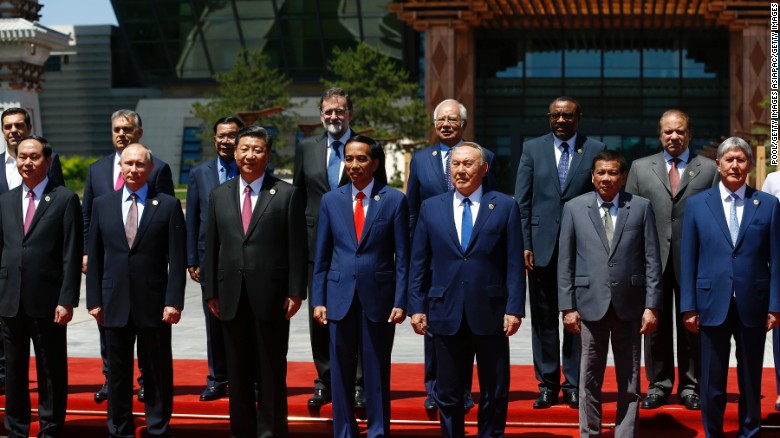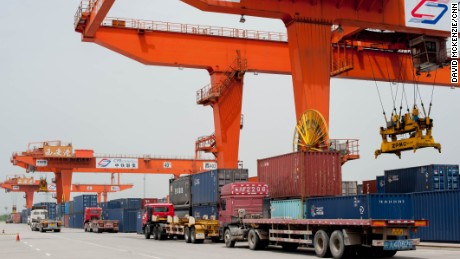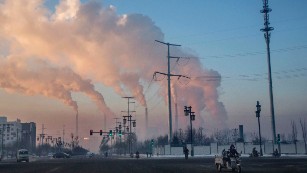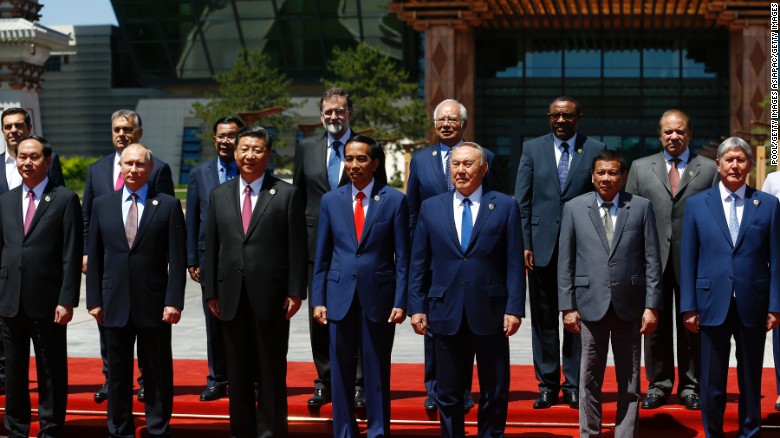China's Xi positions himself as free trade and climate champion
Chinese President Xi Jinping has called for the world to reject protectionism and promote free trade in the latest attempt by Beijing to take up the mantle of globalization since the election of US President Donald Trump.
Speaking to world leaders on the last day of a forum in Beijing to promote its One Belt, One Road (OBOR) trade and infrastructure initiative, Xi said "economic globalization has encountered some setbacks."
"Many countries are pondering the way forwards," he added. "(But) in a world of growing interdependence and challenges ... no country can tackle all the challenges or solve the world's problems on its own."
A communiqué released by China and signed by 30 world leaders in attendance at the forum emphasized the importance of working to "build an open economy, ensure free and inclusive trade, (and) oppose all forms of protectionism."
Debate over protectionism exposes a growing rift between Washington and other major economies, particularly China. In March, US officials pushed to drop a long-standing public endorsement of free trade and condemnation of protectionism from a statement released by the G-20 group of leading economies.

Russian President Vladimir Putin, Chinese President Xi Jinping and other world leaders pose for a group photo at the Belt and Road Forum in Beijing.
Not so free trade
World leaders redoubled their commitment to free trade in the wake of the global financial crisis in 2008 as they sought to prevent recession turning into a global depression. But Trump has taken a far more skeptical stance, pulling out of the US-led Trans-Pacific Partnership, promising to renegotiate NAFTA with Canada and Mexico, and threatening to slap tariffs or taxes on imports to protect American jobs.
OBOR represents a major push by China to open up new markets to its products and improve trade links with the more than 60 countries taking part in the initiative.
However, critics argue the project is structured to benefit China more than anyone else, and risks burdening developing countries with debt and expensive white elephant projects.
There is also considerable skepticism over China's commitment to free trade. While Beijing has been keen to burnish its anti-protectionist credentials in contrast to Trump's "America First" policy, the reality can be quite different.

China's new Silk Road
Jörg Wuttke, outgoing president of the EU Chamber of Commerce in China, said last week that many foreign firms still face major regulatory barriers and limits to market access in China.
Tom Rafferty, a China analyst at the Economist Intelligence Unit, agrees.
"China's rhetoric on free trade and investment is far better than the reality," he said.
"Large segments of the domestic economy, including its better performing segments in the services sector, remain closed to foreign firms," he added. "One Belt One Road (OBOR) projects will also be challenging for foreign firms to gain a slice of the pie, given that much of the financing for the projects will flow directly from Chinese policy banks to Chinese firms, although there may be some marginal opportunities across the wider supply chain."
Christopher Balding, a professor of economics at Peking University, said that it was "entirely fair to say that Trump is using the rhetoric of a protectionist leader and Xi is effusively using the rhetoric of free trade, markets, globalization, openness and inclusiveness."
While he said "perception can become more powerful than the reality," he added that China "remains a very closed trade and investment market especially when compared to the US."
"By any objective measure, it simply is not even close, even with the new Trump administration," Balding said.
Climate champion

China steps up environmental protection
The OBOR forum communiqué said members remain "determined to protect the planet from degradation, including through taking urgent action on climate change."
It called on "all parties which have ratified it to fully implement" the Paris climate accord, signed by numerous world leaders, including then-President Barack Obama in 2016.
Trump has taken a markedly more skeptical view on climate change than his predecessor however, with many speculating he will pull the US out of the Paris agreement entirely.
This has led some to speculate that China will emerge as a global leader on fighting climate change, something that Beijing has embraced as the country has taken major strides in cutting emissions and promoting investment in renewable energy.
However, Balding said that, as with free trade, "climate change would be another area where the rhetoric does not match the reality."
"China is absolutely investing ... large sums of money in renewables like solar and wind," he said. "However, they are also investing enormous sums in building even more coal-fired plants not just in China but around the world."
News Courtesy: www.cnn.com











